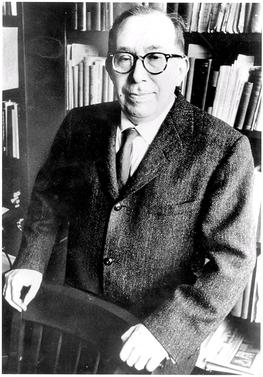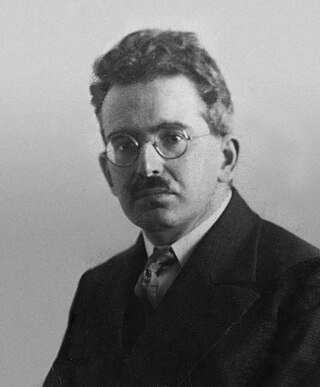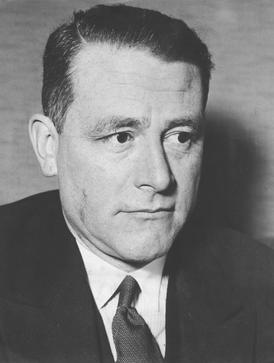
Martin Heidegger was a German philosopher who is best known for contributions to phenomenology, hermeneutics, and existentialism. He is often considered to be among the most important and influential philosophers of the 20th century.

Leo Strauss was a German-American scholar of political philosophy who specialized in classical political philosophy. Born in Germany to Jewish parents, Strauss later emigrated from Germany to the United States. He spent much of his career as a professor of political science at the University of Chicago, where he taught several generations of students and published fifteen books.

Walter Bendix Schönflies Benjamin was a German Jewish philosopher, cultural critic, media theorist, and essayist. An eclectic thinker who combined elements of German idealism, Romanticism, Western Marxism, Jewish mysticism, and Neo-Kantianism, Benjamin made enduring and influential contributions to aesthetic theory, literary criticism, and historical materialism. He was associated with the Frankfurt School, and also maintained formative friendships with thinkers such as playwright Bertolt Brecht and Kabbalah scholar Gershom Scholem. He was related to German political theorist and philosopher Hannah Arendt through her first marriage to Benjamin's cousin Günther Anders though the friendship between Arendt and Benjamin outlasted her marriage to Anders. Both Arendt and Anders were students of Martin Heidegger, whom Benjamin considered a nemesis.

The Frankfurt School is a school of thought in sociology and critical philosophy. It is associated with the Institute for Social Research founded at Goethe University Frankfurt in 1923. Formed during the Weimar Republic during the European interwar period, the first generation of the Frankfurt School was composed of intellectuals, academics, and political dissidents dissatisfied with the contemporary socio-economic systems of the 1930s; namely, capitalism, fascism, and communism.
Continental philosophy is a term used to describe some philosophers and philosophical traditions that do not fall under the umbrella of analytic philosophy. However, there is no academic consensus on the definition of continental philosophy. Prior to the twentieth century, the term "continental" was used broadly to refer to philosophy from continental Europe. A different use of the term originated among English-speaking philosophers in the second half of the 20th century, who used it to refer to a range of thinkers and traditions outside the analytic movement. Continental philosophy includes German idealism, phenomenology, existentialism, hermeneutics, structuralism, post-structuralism, deconstruction, French feminism, psychoanalytic theory, and the critical theory of the Frankfurt School as well as branches of Freudian, Hegelian and Western Marxist views. There is widespread influence and debate between the analytic and continental traditions; some philosophers see the differences between the two traditions as being based on institutions, relationships, and ideology rather than anything of significant philosophical substance.

Fredric Jameson is an American literary critic, philosopher and Marxist political theorist. He is best known for his analysis of contemporary cultural trends, particularly his analysis of postmodernity and capitalism. Jameson's best-known books include Postmodernism, or, The Cultural Logic of Late Capitalism (1991) and The Political Unconscious (1981).

Carl Schmitt was a German jurist, political theorist, and prominent member of the Nazi Party. Schmitt wrote extensively about the effective wielding of political power. An authoritarian conservative theorist, he is noted as a critic of parliamentary democracy, liberalism, and cosmopolitanism. His work has been a major influence on subsequent political theory, legal theory, continental philosophy, and political theology, but its value and significance are controversial, mainly due to his intellectual support for and active involvement with Nazism.
Karl Löwith was a German philosopher in the phenomenological tradition. A student of Husserl and Heidegger, he was one of the most prolific German philosophers of the twentieth century.

Being and Time is the 1927 magnum opus of German philosopher Martin Heidegger and a key document of existentialism. Being and Time had a notable impact on subsequent philosophy, literary theory and many other fields. Though controversial, its stature in intellectual history has been compared with works by Kant and Hegel. The book attempts to revive ontology through an analysis of Dasein, or "being-in-the-world." It is also noted for an array of neologisms and complex language, as well as an extended treatment of "authenticity" as a means to grasp and confront the unique and finite possibilities of the individual.

Telos is a quarterly peer-reviewed academic journal that publishes articles on politics, philosophy, and critical theory, with a particular focus on contemporary political, social, and cultural issues.
A cultural critic is a critic of a given culture, usually as a whole. Cultural criticism has significant overlap with social and cultural theory. While such criticism is simply part of the self-consciousness of the culture, the social positions of the critics and the medium they use vary widely. The conceptual and political grounding of criticism also changes over time.

"The Origin of the Work of Art" is an essay by the German philosopher Martin Heidegger. Heidegger drafted the text between 1935 and 1937, reworking it for publication in 1950 and again in 1960. Heidegger based his essay on a series of lectures he had previously delivered in Zurich and Frankfurt during the 1930s, first on the essence of the work of art and then on the question of the meaning of a "thing", marking the philosopher's first lectures on the notion of art.

Philosopher Martin Heidegger joined the Nazi Party (NSDAP) on May 1, 1933, ten days after being elected Rector of the University of Freiburg. A year later, in April 1934, he resigned the Rectorship and stopped taking part in Nazi Party meetings, but remained a member of the Nazi Party until its dismantling at the end of World War II. The denazification hearings immediately after World War II led to Heidegger's dismissal from Freiburg, banning him from teaching. In 1949, after several years of investigation, the French military finally classified Heidegger as a Mitläufer or "fellow traveller." The teaching ban was lifted in 1951, and Heidegger was granted emeritus status in 1953, but he was never allowed to resume his philosophy chairmanship.

Andrew Feenberg is an American philosopher. He holds the Canada Research Chair in the Philosophy of Technology in the School of Communication at Simon Fraser University in Vancouver. His main interests are philosophy of technology, continental philosophy, critique of technology and science and technology studies.
This is a list of articles in continental philosophy.
Peter Eli Gordon is a historian of philosophy, a critical theorist, and intellectual historian. The Amabel B. James Professor of History at Harvard University, Gordon focuses on continental philosophy and modern German and French thought, with particular emphasis on the German philosophers Theodor Adorno and Martin Heidegger, critical theory, continental philosophy during the interwar crisis, and most recently, secularization and social thought in the 20th century.
The Budapest School was a school of thought, originally of Marxist humanism, but later of post-Marxism and dissident liberalism that emerged in Hungary in the early 1960s, belonging to so-called Hungarian New Left. Its members were students or colleagues of Georg Lukács. The school was originally oriented towards developing Lukács' later works on social ontology and aesthetics, but quickly began to challenge the paradigm of Lukácsian-Marxism, thus reconstructing contemporary critical theory. Most of the members later came to abandon Marxism. The school also critiqued the "dictatorship over needs" of the Soviet states. Most of the members were forced into exile by the pro-Soviet Hungarian government.

Herbert Marcuse was a German-American philosopher, social critic, and political theorist, associated with the Frankfurt School of critical theory. Born in Berlin, Marcuse studied at the Humboldt University of Berlin and then at Freiburg, where he received his PhD. He was a prominent figure in the Frankfurt-based Institute for Social Research – what later became known as the Frankfurt School. In his written works, he criticized capitalism, modern technology, Soviet Communism, and popular culture, arguing that they represent new forms of social control.
Men of Ideas is a 1978 BBC television series presented by Bryan Magee. There were 15 episodes, in which Magee interviewed noted philosophers.
Peter Uwe Hohendahl is an American literary and intellectual historian and theorist. He served as the Jacob Gould Schurman Professor of German Studies at Cornell University, where he is now a professor emeritus.











